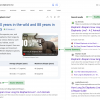Evernote is a widely used note-taking and organizing app that allows users to capture, store, and manage various types of information, including notes, photos, PDFs, and receipts. It offers features like searchable notes, file attachments, and syncing capabilities across multiple devices. In this comprehensive review, we will explore the pros and cons of Evernote to help you determine if it is the right choice for your note-taking needs.
We will evaluate Evernote based on three criteria: pricing, core features, and user experience. Let’s dive in.
Pricing:
Evernote offers three pricing plans for individual use and one plan designed for teams. The Personal and Professional plans have a 7-day free trial. Here are the pricing details:
– Free plan: Includes syncing up to two devices, 60 MB of monthly uploads, and a 25 MB maximum note size. It also allows you to clip web pages and attach various files.
– Personal plan: Costs $14.99 per user per month billed monthly, or $10.83 per user per month billed annually. This plan includes syncing unlimited devices, 10 GB of monthly uploads, and a 200 MB maximum note size. It also offers additional widgets, due dates, reminders, and customizable templates.
– Professional plan: Costs $17.99 per user per month billed monthly, or $14.17 per user per month billed annually. This plan provides 20 GB monthly uploads, access to all widgets, enhanced search capabilities, and integrations with popular apps like Slack and Microsoft Teams.
– Teams plan: Costs $24.99 per user per month billed monthly, or $20.83 per user per month billed annually. It includes 20 GB monthly uploads per user, the ability to collaborate in shared spaces, and a dedicated Success Manager for teams with 25+ seats.
Core Features:
Evernote offers a range of features that enhance the note-taking experience:
– Note taking: Evernote provides a simple and user-friendly note-taking tool with various content and formatting options, such as links, tables, attachments, images, audio recording, and code blocks. It also allows for basic sketches.
– Search: Evernote offers Optical Character Recognition (OCR), which enables users to search for text inside images, including handwritten notes. It also provides advanced Boolean search capabilities for Professional and Teams plans.
– Home dashboard: The free plan comes with standard widgets like recent and suggested notes, scratch pad, and recently captured documents. Paid plans offer additional customizable widgets for a personalized dashboard.
– Document scanner: Evernote’s app features a document scanner that captures and digitizes photos of handwritten lists, business cards, and other content. It also enables text search in scanned documents for paid plans.
– Calendar integration: With paid plans, users can connect their personal Google calendar or Gmail account to Evernote for easy access to events and the ability to create notes for meetings.
– Task management: Evernote provides task management features like checklists, due dates, reminders, and assigning tasks to others for Professional and Teams plans.
User Experience:
Evernote excels in user experience with its clean and intuitive interface. Seamless syncing across devices, robust search functionality, and easy organization with tags and shortcuts make accessing and managing notes effortless. Users can quickly create, organize, and find notes, making Evernote an excellent choice for users of all levels.
Pros and Cons:
Pros:
– Simple and user-friendly interface
– Free forever plan available for individual use
– Powerful search functionality
– Document scanner and customizable widgets
– Calendar integration and task management features for paid plans
Cons:
– Some features limited to higher-tier paid plans
– Expensive compared to competitors
– Free plan allows syncing only two devices
– Syncing issues reported by some users
Best Uses for Evernote:
Evernote is a versatile tool suitable for personal and professional use. It can be used for personal organization, project management, collaboration, research, and note-taking. Its ability to create to-do lists, set reminders, store important documents, and organize information makes it ideal for various purposes.
Integration:
Evernote offers integrations with Google and Microsoft products, including Gmail, Outlook, Google Drive, Slack, and Microsoft Teams. These integrations enhance productivity and collaboration within the app.
Who is Evernote Best For?
Evernote caters to two distinct groups: casual users who need a simple note-taking tool and can benefit from the free plan, and power users who create many notes and can justify paying for premium plans. Users looking for more features than the free plan but unwilling to pay higher prices may find Evernote’s pricing structure less suitable.
Alternatives and Competitors:
Alternative note-taking apps include Microsoft OneNote, Zoho Notebook, and Google Keep. Each offers unique features and pricing plans, catering to different user preferences and needs.
Conclusion:
Evernote is a widely used note-taking app with robust features and a user-friendly interface. It offers various plans to suit different user requirements and integrates with popular apps. While it may not be suitable for everyone due to its pricing and limited free plan, Evernote remains a top choice for those seeking a powerful and versatile note-taking app.






